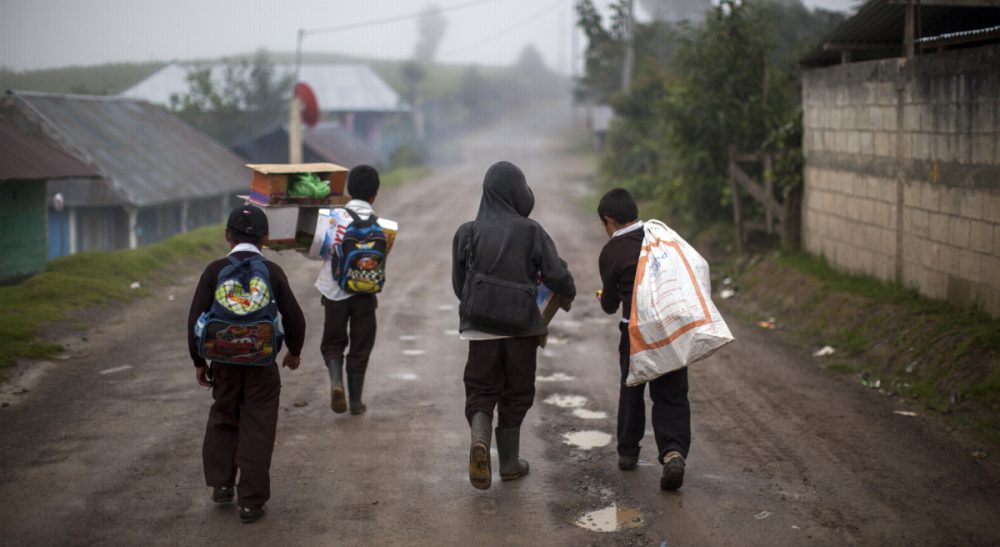Advertisement
America's Debt To The Children Crossing Our Border

If my hometown of Newton, Mass., had the same murder rate as Honduras, there would be roughly 86 homicides annually. Boston would have 636. As it stands, there were 40 homicides in Boston last year and none in Newton.
Before the state descends into NIMBY-ism with respect to the relocation of child immigrants from the southern border, we should take note of these numbers — and not only the numbers, but also the explanations behind them.
Important questions remain about Massachusetts’ relocation plan. Not least is why rich towns like Newton aren’t on the list of transfer sites. But while we hash out the particulars, let’s do so in a spirit of constructiveness and with one hand on the welcome mat. Because receiving these refugees is less a matter of choice than of obligation. It is America’s fault that Central American children are knocking down our doors.
...receiving these refugees is less a matter of choice than of obligation. It is America’s fault that Central American children are knocking down our doors.
Tens of thousands of young people are fleeing Honduras, El Salvador and Guatemala thanks to America’s war on drugs. The immediate source of the violence these children are escaping is U.S. drug prohibition, which creates a lucrative market for criminal gangs that have moved south, thanks to the closure of the Caribbean drug corridor and Mexico’s military crackdown on its own cartels.
Violence in Central America is not new, and neither is the American hand in it. It is important to recognize the history and take responsibility for conditions we created.
The story goes back a long way, but 1954 is a convenient starting point. That’s when a CIA-backed coup overthrew Guatemala’s democratically elected president, Jacobo Árbenz Guzmán, after he ordered the redistribution of farmland to peasants. Decades of U.S.-supported dictatorship followed.
In the 1960s, U.S. “advisors” trained Guatemalan death squads that went on to terrorize civilians and wage a vicious counterinsurgency against leftist guerrillas.
Later, in the 1980s, much of the killing was led by President José Efraín Ríos Montt, with the backing of the Reagan administration.
Throughout that same decade, El Salvador’s U.S.-funded military was engaged in a pitched battle with leftist opponents of its own. Neither side in that war comported itself honorably, but of 22,000 complaints about the violence gathered by a United Nations truth commission, 85 percent condemned the actions of the U.S.-backed forces.
Advertisement
And as war raged in El Salvador, the CIA and the School of the Americas in Fort Benning, Ga., were training Honduran government assassins bent on eliminating political opponents of the anti-Communist regime. The goal was to maintain Honduras as a reliable U.S. outpost in otherwise-restive Central America.
These bitter conflicts laid the foundation for the refugee challenge we now face. Persistent violence and poverty have left large portions of Central America ungovernable and, therefore, ripe for an influx of drug pushers.
Prohibition arms these pushers with guns and money. The black market raises prices, which raises the stakes, begets violence and corrupts government and law enforcement. These forces, in which American responsibility is clear, are driving children to our borders.
Many Americans sympathetic to the plight of child refugees still don’t want them in this country, let alone in their hometowns. They argue that there is strife to spare in the world, and no one nation can repair that. This is true. However, when it comes to Central American refugees, the choice for the United States is not whether to help a neighbor to whom one owes no special obligation, but whether to pay off a heavy debt.
It’s not about turning children back at our borders or deporting them once they are here; it is about improving conditions in their countries of origin...
There are also those who claim that accepting refugees — indeed, any immigrants — encourages more to come and overwhelms America’s legal and logistical capacities to integrate them. Some in this country have sought to alleviate this by making America an inhospitable place. Hence we have paramilitary operations on the southern border and harsh legislation at the state level.
These nativist and rule-of-law anxieties are both unfounded and self-destructive. They also miss the point: It’s not about turning children back at our borders or deporting them once they are here; it is about improving conditions in their countries of origin so that they and their parents deem it less risky to stay than to flee.
To do so, we must start by ending the war on drugs. This means decriminalizing all illegal narcotics and disbanding related law enforcement operations. Drug addicts should get therapy, not prison time. Drug sales should be regulated, but not so heavily that they breed a new black market. This is the only way to undermine, finally, the drug gangs raining violence on our own cities and in those in Mexico and Central America.
The United States must invest in Central American institutions of commerce, education and governance. To the extent that handling a tide of illegal immigrants is a challenge and an expense for this country, shoring up the states south of us will be to our benefit.
By helping our Central American neighbors to be more like the United States — an imperfect nation, to be sure, but a desirable place to live — we will go some way stemming the flow of illegal immigrants into our country. And we have the power to halt the arrival of drug war refugees, in particular. But until we exercise it, they are our responsibility.
Related:
